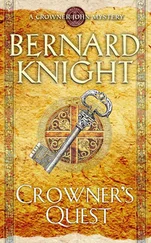Bernard Knight - Crowner's Crusade
Здесь есть возможность читать онлайн «Bernard Knight - Crowner's Crusade» весь текст электронной книги совершенно бесплатно (целиком полную версию без сокращений). В некоторых случаях можно слушать аудио, скачать через торрент в формате fb2 и присутствует краткое содержание. Жанр: Исторический детектив, на английском языке. Описание произведения, (предисловие) а так же отзывы посетителей доступны на портале библиотеки ЛибКат.
- Название:Crowner's Crusade
- Автор:
- Жанр:
- Год:неизвестен
- ISBN:нет данных
- Рейтинг книги:5 / 5. Голосов: 1
-
Избранное:Добавить в избранное
- Отзывы:
-
Ваша оценка:
- 100
- 1
- 2
- 3
- 4
- 5
Crowner's Crusade: краткое содержание, описание и аннотация
Предлагаем к чтению аннотацию, описание, краткое содержание или предисловие (зависит от того, что написал сам автор книги «Crowner's Crusade»). Если вы не нашли необходимую информацию о книге — напишите в комментариях, мы постараемся отыскать её.
Crowner's Crusade — читать онлайн бесплатно полную книгу (весь текст) целиком
Ниже представлен текст книги, разбитый по страницам. Система сохранения места последней прочитанной страницы, позволяет с удобством читать онлайн бесплатно книгу «Crowner's Crusade», без необходимости каждый раз заново искать на чём Вы остановились. Поставьте закладку, и сможете в любой момент перейти на страницу, на которой закончили чтение.
Интервал:
Закладка:
‘I expect it’s to talk about a priest getting murdered and two nuns being frightened out of their wits!’ replied John gruffly.
He was quite right in his forecast, as he discovered as soon as he arrived at John de Alencon’s house. Many of the canons lived in the houses that lined the north side of the Cathedral Close. Exeter was a secular cathedral in that it was not part of a monastic establishment, such as an abbey and had no monks. It was governed by a Chapter of twenty-four canons, who derived their incomes from the livings of various churches. Some of them were independently affluent and lived in luxury in large houses, both in the cathedral precinct and in estates elsewhere. John de Alencon was not one of those who indulged in ostentatious comfort, but preferred a modest, ascetic life. His house in Canon’s Row was plainly, almost sparsely furnished and he had the minimum number of servants to keep his household functioning.
John de Wolfe was no great admirer of the senior clergy, who he considered generally to be a lazy, avaricious lot who farmed out many of their duties to their subservient vicars. But he admired his namesake for his simple lifestyle and his devotion to King Richard, especially as many of the other canons leaned towards Prince John.
Though generally spartan in his tastes, de Alencon had a weakness for fine wines, so even at that early time of day, a cup of good Anjou red was set before de Wolfe when he called upon his friend. They sat in the study, a bare room with only a table, a few hard chairs and a large wooden cross on the wall. The archdeacon, his lined face looking even more worried than usual, got straight to the point.
‘This lawlessness is getting too much to bear, John. I know you have no official standing in the matter, but you seem the only man in Exeter who seems to be involved in combating it! The city is full of praise for you in finding the killer of that unfortunate king’s messenger that I put to rest in the cathedral yard not long ago.’
‘Pure chance, I’m afraid,’ said John. ‘I just seem to have the knack of being around when there is some violence!’
De Alencon raised a hand in deprecation. ‘You are too modest, as always. You also saved the lives of those two nuns on the road, where our brother priest was so foully murdered. Now today I hear of your involvement in these dreadful crimes last night, not a few hundred paces from the cathedral itself.’
John took a sip of the wine and shrugged. ‘I hate seeing evil go unpunished — and these days, it seems to be not only unpunished, but ignored!’
The priest nodded his agreement. ‘Exactly, which is why I wanted your advice. We have discussed this in Chapter several times, especially since the killing of the priest from Tavistock and the disgraceful treatment of the nuns. At our Chapter meeting early today it was resolved that something must be done.’
‘Easy to say, but much harder to achieve,’ observed John.
‘Chapter wants a proper sheriff appointed, one who would enforce law and order.’
‘That’s rich! A sheriff is the king’s representative in every county, yet Devon was given to the Count of Mortain to rule outwith the royal authority. As you don’t need telling, many of your canons favour Prince John, so they can’t have it both ways.’
‘But that’s exactly what they do want,’ said the archdeacon gently. ‘They are going to ask Prince John to install a sheriff — and are suggesting Richard de Revelle as the appointee.’
De Wolfe looked aghast at this proposition. ‘That would be a disaster! He’d never stir himself from his chamber, where he counts the taxes and takes his own tithes from them. I had heard such a suggestion, as the prince has already got him counting his coins. But as a fearless law officer, he would be worse than useless.’
‘I tend to agree, John. But they are set upon it and as you know, some have the ear of the prince. I thought I would warn you what is afoot.’
‘But appointing a sheriff is not within his gift!’ objected de Wolfe. ‘I tell you now, the Chief Justiciar will not agree and I doubt the king would either, except that he is far away in captivity.’
De Alencon shrugged. ‘I suspect that the prince will just go ahead without such approval. After all, he is virtually the absolute ruler of six counties and has appointed his own chancellor, exchequer and other officers, independent of Winchester or London.’
De Wolfe shook his head in despair. ‘It will be a fiasco, John. Mark my words, when Hubert Walter gets to hear of this, he will forbid it. He has already spoken to me about his concerns that the prince is once again planning to challenge the Lionheart’s right to the throne. Look how places are covertly being fortified and garrisoned, places like St Michael’s Mount and Berry Peverel.’
They spoke further about the ominous signs of revolt and de Alencon told him that when a new bishop was installed in a few months time, the likely incumbent would be Henry Marshal, the Dean of York, who was another keen supporter of the prince.
John came away from Canon’s Row with an even stronger presentiment of trouble, but the prospect of his brother-in-law becoming sheriff was the worst part. His arrogant pomposity would be intolerable — and no doubt Matilda’s pride in becoming sister of a sheriff would be even more insufferable.
He collected his horse from the stables opposite his house and rode first to the tiny hospital at St John’s Priory, just inside the East Gate. This had but six monks offering the only medical care in the city, apart from a few apothecaries who dispensed medicines. Outside the city, there was nothing at all and the villagers depended on ‘wise women’ and helpful neighbours for their only hope of treatment.
At St John’s, the small infirmary was run by Brother Saulf, a tall, gaunt man who had once attended the famous medical school of Montpellier in southern France. He told John that Richard de Beltona was still in a bad state, but his deep unconsciousness had lightened in the last few hours.
‘I trust in God that he will not die, but it may be days before he has recovered enough of his wits to speak, if he ever does,’ said Saulf, in his deep, sonorous voice. ‘And even if he does, he probably will not remember the events that caused his injury.’
John went into the single ward of the little hospital, a high chamber with a row of pallets down each side and a huge wooden crucifix on the end wall, indicating that most of the healing here was done by God. The hall was full of sick and injured and Beltona was lying immobile in one of those nearest to the door. He lay breathing heavily, his eyes closed, one swollen with blood that had seeped down into his eyelids from the swelling above, reminding John of the ache in his own cranium.
There was nothing to be done except to thank Saulf and hand him a few coins towards the hospital funds. Then John mounted Bran again and went the mile or so to Polsloe Priory, to enquire after the well-being of Mistress Clarice. The small Benedictine house was surrounded by a high wall and the gatekeeper was not disposed to admit an unknown man, even though he called himself Sir John de Wolfe. Evidently his reputation had not percolated to this outpost in the woods outside the city.
However, after he had firmly closed the gate on John, he went across to the modest buildings of the priory and soon returned with the forbidding figure of Dame Madge. She was almost as tall as John, though slightly stooped. A long face, with a large hairy mole on one cheek, was usually set in a grim expression, except when dealing with her sick and often frightened patients, who she treated with a gentleness that contrasted markedly with her usual manner.
They stood in the open gateway until John had explained who he was and that he had only called to enquire after the stricken lady’s condition. The old nun thawed immediately and invited John to the refectory for a meal, which he gracefully declined.
Читать дальшеИнтервал:
Закладка:
Похожие книги на «Crowner's Crusade»
Представляем Вашему вниманию похожие книги на «Crowner's Crusade» списком для выбора. Мы отобрали схожую по названию и смыслу литературу в надежде предоставить читателям больше вариантов отыскать новые, интересные, ещё непрочитанные произведения.
Обсуждение, отзывы о книге «Crowner's Crusade» и просто собственные мнения читателей. Оставьте ваши комментарии, напишите, что Вы думаете о произведении, его смысле или главных героях. Укажите что конкретно понравилось, а что нет, и почему Вы так считаете.












